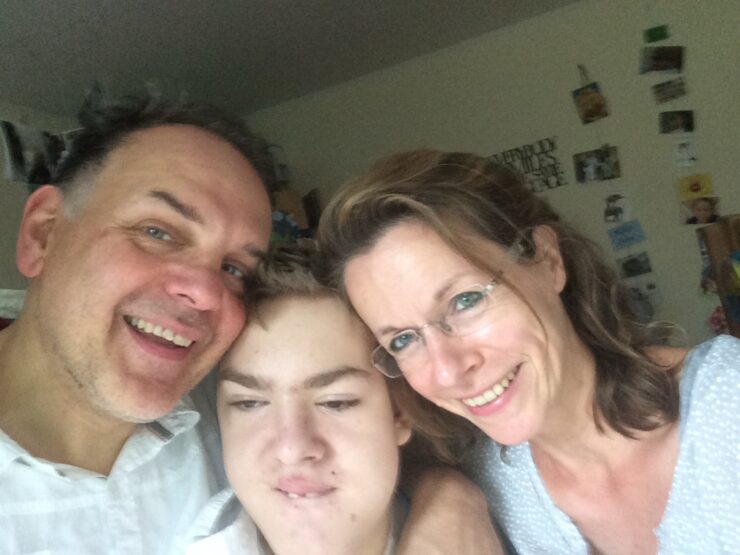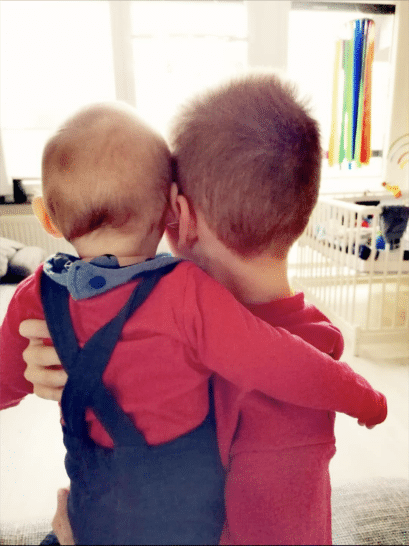“What helped most was the endless love for my children”
Brigitte from Germany is the mother of Leonard and Kilian, both of whom have PCH2. Leonard died in 1995 at the age of nine months. Kilian was born in 1996 and is now 27 years old.
In this interview, she recounts the difficulties of the pre-internet era and the challenges of everyday life for her young sons. But most importantly, she talks about the endless love for her children, from which she continues to draw the strength to carry on.
Dear Brigitte, who is in your family?
Us parents, Brigitte and Josef, and our sons Leonard and Kilian.
How did your PCH2 journey start?
When Leonard was born in 1994, it was clear relatively soon after birth that something wasn’t right. He couldn’t feed properly and was very weak, so a nasogastric tube was inserted relatively quickly. A chief physician bluntly told me that the child had severe cerebral damage. Up until then, I didn’t even know exactly what that meant.
A world collapsed for us. Apart from the fact that I had excessive amniotic fluid, the pregnancy was completely normal.
After about 3 weeks, we took Leonard home which marked the beginning of a very challenging time.
Shortly before his death, after many visits to the doctor, the possibility was raised for the first time that he might have olivo-ponto-cerebellar hypoplasia type 2, a very rare autosomal recessive disorder. However, this could not be proven as the relevant gene was not yet identified; we did not receive a diagnosis before his death.
In those pre-internet days, it wasn’t easy to find information, let alone meet other affected parents.
We just felt completely isolated.
After Kilian was born, we knew quite quickly that he was also affected and the suspected diagnosis of OPCH2 was substantiated. In 2007 we finally had the genetic proof.
How did you feel during that time?
The first few days with Leonard and also Kilian were a disaster.
With Leonard, we were completely unsuspecting and stunned. I had never been in personal contact with a disabled person before. “Something like this only happens to others…” – We therefore felt unsure and helpless.
However, we got help from our fantastic pediatrician. Early intervention was involved, physiotherapy sessions were arranged, etc. Lots of appointments that we had never actually wanted.
It was incredibly difficult to see how other kids developed, how the gap between them and Leonard grew. So I started to avoid such social interactions more and more. It just hurt.
We also had to endure being asked how you can have ‘a child like that’ twice.
Anyone who knows how strong the wish for a (healthy) child can be will probably understand how painful that was.
What symptoms did your sons have? Did they change over time?
In the first 3 weeks after birth they were sleepy and weak, then the restlessness started: High muscle tension, lots of crying, lack of day-night rhythm, dislike of going by car, swallowing difficulties, abdominal pain, frequent respiratory infections, and, in Kilian’s case, epilepsy followed about 1.5 years later.
For Kilian, restlessness remained the biggest problem. We tried various medications and sedatives, all of which eventually stopped working.
As he grew in size and strength, it became increasingly difficult to handle him.
In 2011, Kilian underwent a tracheostomy. Since then he has been relatively stable.
Which symptoms were the most difficult for you and your children?
The swallowing disorder, the week-long restlessness and the epilepsy. On top of that, uncertain pain that could not be diagnosed. It was and still is hard to see your own child suffer like that.
What helped you to manage your daily life as a family? Where did you get support?
We had support from my mother, friends and paid babysitters. Short-term care facilities also provided some relief.
Avoiding unwanted pity and unconsidered comments such as “It will fix itself eventually” also helped a lot.
In our case, a certain innate (or acquired) resilience was certainly also an advantage.
But what helped most was the endless love for my children. And it still helps me with Kilian.
You are the parents of a PCH Angel. How did you say goodbye to Leonard? What gave you strength afterwards?
Sadly, we were unable to say goodbye to Leonard. He passed away unexpectedly and we found him on his bed that morning. He had aspirated something without us noticing. It was a terrible shock. We felt endlessly guilty and asked ourselves whether he had suffered and for how long. These thoughts still persist, albeit to a much lesser extent.
For the first 2-3 years, a discussion group for orphaned parents helped us a lot.
Can you tell us about your favorite moments as a family?
Walks and trips that Kilian and Leonard enjoyed; when they were happy without anything causing them distress.
The moments when they were snug and content in my arms were wonderful. Moments when our bond was tangible.
Why are your children someone really special?
Because they are different from others; because they are the most vulnerable and innocent beings there are.
Because they always respond to affection when no symptoms bother them.
What advice would you like to give to the parents of a child who has just been diagnosed with PCH2?
It is not the end! You will feel endless love for your child and it will change your life for the better (even though I responded to such comments with a strained smile at first…).
The first stage of shock and despair will come to an end at some point.
Seek help and support. You will not make it on your own. Fight for some time off (short-term care). Learn to relinquish responsibility, by the hour or by the day!
„What helped most was the endless love for my children.“
(Brigitte, mother of Leonard and Kilian)
Share Your Own Story
to support and encourage other families on their journey.


